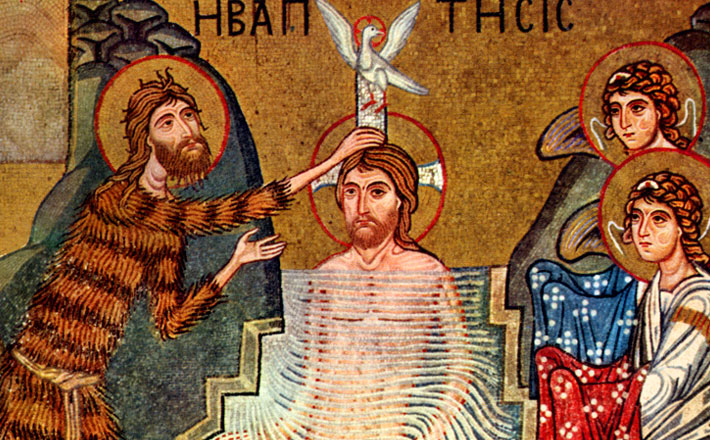Commentary on Mark 1:4-11
This Sunday’s Prayer of the Day, with language that echoes all three appointed readings, orients us to the powerful observance of Jesus’ baptism with these words:
“Holy God, creator of light and giver of goodness, your voice moves over the waters. Immerse us in your grace, and transform us by your Spirit…” (Evangelical Lutheran Worship, 22). Light and water from Genesis 1 remind us of the eternity in which God resides, creating order out of the chaos of unordered matter. In the context of that immensity, the Son, the Beloved, is baptized to know himself, to be transformed into the subservience John calls all people to engage so that he will carry out the mission he has been given.
When we look just at the Gospel reading for the Baptism of Our Lord, we do not see Jesus as fully as we see John the Baptist, his forerunner. Jesus remains a mystery while John stands before us in all the wildness of a life that shuns the interiors of buildings, eating what God provides in nature, speaking from the humility of a self that knows to whom it is indebted. We know what John wears; we are not told what Jesus wears. It is that clear of a difference. John, though peculiar according to our standards, is a fully human creature while Jesus—enigmatic, given to hearing a voice no one else hears—is identified in this scene in a way no one else has or will be known.
In Jesus’ baptism, as the Synoptic Gospels tell it, nature itself is upended. The heavens are “torn apart” (verse 10). All creation in the moment of Jesus’ baptism is altered. Out of that rupture comes the Holy Spirit in a form that is described as a dove. That dove does not simply alight on Jesus, because in the Greek, eis auton can be said to have come into him. He is infused with the Spirit from God. A new reality has come into the world, transforming all things including the seen (the heavens and a dove) and the unseen (a voice).
As befits this wondrous transformation, it is on the banks of the River Jordan on “the border between the wilderness and the land of milk and honey” where John stands, crying out for the people to repent and be baptized.1 He comes out of the wilderness with a prophetic announcement, that he is “not worthy” to serve, in even a lowly manner, the one who will bring a new kind of baptism.
We do not know why John the Baptist cries out to the people to repent and be baptized or how he knows Jesus is coming and will change the world. But like the earlier prophets, John has a vision that requires the people to prepare themselves through repentance and baptism in water. His washing is more than a ritual bath, more than a repeated ablution required by law. The new bath has become the first sacrament.
John calls the people to faith through repentance and baptism. Out of the wilderness came the voice that knew faith as a gift essential to life. Alexander Schmemann deepens our understanding of the relationship between sacrament and faith in this way:
The essential question about faith in its relationship to the sacrament is: what faith, and even more precisely, whose faith? And the equally essential answer to this question is: it is Christ’s faith given to us, becoming our faith and our desire…
Faith, Schmemann continues, is either a response to God’s call or “the very reality of that to which the call summons.” Faith, in other words, is what baptism imparts to us. Through the Holy Spirit, in baptism we are given the faith of Jesus. “The presence in this world of Christ’s faith is the Church.”2 Baptism opens our hearts and our minds to becoming instruments that bring unity and peace to our neighbors.
Sometimes that reality—the faith of Jesus within the baptized—is not apparent to us. In the words of John the Baptist, we hear the cry to Repent and Be Baptized. The people come to him “confessing their sins” (verse 5). We see a crowd responding to a concrete action that then allows them to be washed in baptismal waters.
John, however, describes a different baptism through Jesus. In Jesus’ baptism, the Holy Spirit has the central role. It is the Spirit rather than the washing that affects the transformation of the baptized. The Spirit creates a profound change in us because, at least in most Christian traditions, we receive faith that does not result from our fulfilling John’s requirement to repent. We baptize infants who have no words of repentance.
If John’s baptism is our focus, we may forget that we have been “immersed” in God’s gracious welcome and “transformed” by the Holy Spirit. We can be caught up in our participation in the work of the Church, failing to acknowledge the mystery itself. We may forget that the mystery, which is God’s defeat of death in the resurrection of Jesus, is the reason we come together to care about the world. The work we do may seem to be the goal rather than the life that grows out from gratitude.
Through Jesus’ baptism, the Church is born and his faith washes over Earth through the baptized. By his baptism in the waters of the earth, the faith of Jesus made all waters sacred. The faith of Jesus is the reason Christians seek to keep the waters of earth clean, nourishing, plentiful, and free for everyone. Water is life itself in more ways than we can fathom.
Notes
- Ted A. Smith, “Mark 1:4-11: Homiletical Perspective,” in Feasting on the Word, Year B, Vol. 1: Advent through Transfiguration, ed. David L. Bartlett and Barbara Brown Taylor (Louisville: WJK, 2008), 239.
- Alexander Schmemann, Of Water & The Spirit: A Liturgical Study of Baptism (Crestwood, NY: St. Vladimir’s Seminary Press, 2000), 67-78.


January 10, 2021